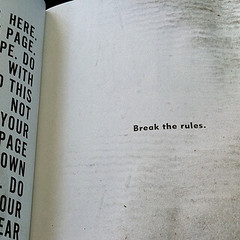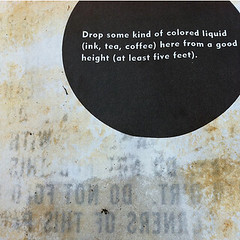The best in poetry (and poetic things), this week with Seth Haines.
1 Art
I have always wondered about the resale market for stolen art. We’ve all seen the great art-heist capers where a stolen Monet was carried across the world in a courier tube and sold to some Italian billionaire who, despite running an international crime ring with a penchant for murder and mayhem, has a tender spot for water lilies. But what does an art thief do with something more awkward and less transportable, something like a bust of Ben Franklin valued at $3 million, for instance? According to this piece by the Philadelphia Inquirer, the thief returns it to the rightful owner. I’m only wagering a guess, but I suspect that Mr. Franklin’s robber found the resale market for the head of a founding father to be less than… ahem… robust.
And speaking of the busts of statesmen, check out these odd likenesses of Barack Obama and Mitt Romney. The sculptures were created by Ian Williams, who was recently dubbed “Play-Doh Artist of the Year.” In my opinion, he should have used the Play-Doh factory string attachment for Romney’s hair.
2 News
This week at Tweetspeak, we’ve been celebrating Oktoberfest, that grand German celebration of royal love, horse racing, and beer. And while some of us are busying ourselves raising pints and inviting hangovers, the more bookish folks in the room are celebrating something a bit more risqué–banned books.
This week is banned book week, and book worms across the country are partying hard. Consider the good folks of Lafayette and their Banned Books Week flash mob. There is truly something to the “cacophony of sound… of thirty people reading from a band book simultaneously….”
Wonder what banned authors like Kurt Vonnegut, Harper Lee, and others have to say about the banning of their works? Check out this article at The Atlantic for more.
3 Publishing
Generally speaking, we at Tweetspeak try to keep an open mind about new ideas in the publishing world. We try not to rush to snap judgments or dismiss innovations in the industry. That being said, allow me to introduce you to the single worst idea in publishing history. Hands down. Period.
An Argentine publishing company has begun printing books with fading ink. That’s right, just two months after cracking the airtight seal of your newest copy of E Libr Qu No P Ede Esper R, the pages will be completely and utterly blank. That is, unless you made notes in the margin or underlined your favorite passages, in which case your book will be full of only random lines and incoherent notes.
According to this BBC report, some authors are “fine” with the concept of their work lasting only a couple of months. Sure they are. After all, could there be any better way to incentivize repeat sales?
4 Poetry at Work
Poetry and work–the two seem almost mutually exclusive, right? Not so. Over the last month, I’ve had the joy of reading a poem by the talented Will Willingham, in which he frankly ponders the merits of a lawsuit as only an Insurance Adjuster could (see the comments for the poem). And it’s not just Willingham that’s getting into the act. Even police officers are arresting audiences with their poetry. (Oh how I love a good pun.) Read this piece about how DEA officer Jesse Fourmy weaves poetry into his day job.
This week, consider writing your own poem drawing from the experiences of your workplace. You might find that it makes the toil all the more enjoyable. And take a look at the new Poetry at Work feature Glynn Young kicked off this week and consider how you might see poetry at work in your own workplace.
5 Creativity
There are times when it’s best to let a video speak for itself. This is one of those times.
6 Write-It
Have you ever written a bad poem? Before you answer “never, ” check out Michael Mlekoday’s Five Marks of Oft Rejected Poems written for the Indiana Review. Prone to boring first lines or subject to over-reaching? Do you have a deep-seated love for a good cliché? If so, chances are you’ve written a bad poem. Thankfully, Mlekoday is here to help you avoid these common mistakes. And after you read his article, consider taking some of your older pieces and reworking them. You might mine a gem or two out of the stack.
7 Poems
I am a firm believer that some of the best living poets are, in fact, songwriters. That’s why we at Tweetspeak compile a monthly theme-based playlist celebrating the best in musical poetry. Consider these angst-ridden lyrics penned by The Civil Wars, who made this month’s Wine and Beer playlist:
Oh your mouth is poison, your mouth is wine
Oh you think your dreams are the same as mine
Oh I don’t love you but I always will
And then there’s this gem in Killer Queen, by Queen:
She keeps Moet et Chandon
In her pretty cabinet
‘Let them eat cake’ she says
Just like Marie Antoinette
We hope you’ll spend some time with this month’s playlist, get to know the sometimes celebrational, sometimes mournful, but always evocative lyrics of poets like Johnny Cash, A Fine Frenzy, and Hank Williams, Jr.
8 People
What do Ezra Pound, E.E. Cummings, and Sylvia Plath, and I all have in common? We’re children of autumn, the offspring of October. Yes, October is a month to celebrate the creative Genius! (Along with beer and banned books, evidently.)
This week, spend some time getting to know the authors of October. Consider picking a few of the authors with whom you have less familiarity, and see if you can dig up a few samples of their poetry at the Poetry Foundation. It will be worth your while, I promise.
9 Education
It is rumored that Winston Churchill once responded to an hyper-corrective memo with some variant of the phrase, “this is the kind of tedious nonsense up with which I will not put….” Whether fact or historical myth, the story is indicative of the kinds of grammatical gyrations for which English sticklers are well-known.
Sure, some rules of the English language are those with which one should not tamper. But in considering which to flout and which to flaunt, to whom does the decision fall? Evidently, Bryan A. Garner and Robert Lane Greene. Read this debate in The Opinion Pages of the New Yorker for a discussion between folks who have greater knowledge than I.
10 Sound n Motion
“There is nothing like making something forbidden that accomplishes more in the way of drawing attention and interest to it.”
Cover photo by Gerald Rich, Creative Commons, via Flickr. Article photos by Claire Burge. Used with permission. Post by Seth Haines.
__________________
Buy a year of Every Day Poems, just $2.99— Read a poem a day, become a better writer. In October we’re exploring the theme Wine and Beer.
- Become a Better Writer: Fly Fishing Artist Date - June 6, 2014
- No Cat Poetry for Fierce Dog Lovers - November 22, 2013
- Exploring Poetry: Penning a Ghazal - October 18, 2013












Maureen Doallas says
Wonderful compilation, Seth.
Donna says
“I remember better when I paint” is very powerful and holds a lot of personal meaning for me…. thank you for sharing it here.
Maureen is right… it’s a great 10!
Megan Willome says
It’s Oktoberfest in my town this weekend. I’ll have my Hefe-Weizen in a tourist-free zone: my home.